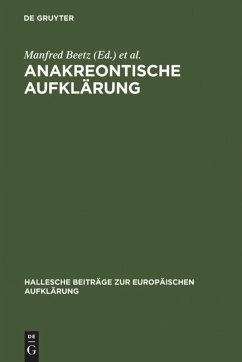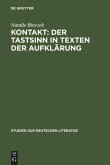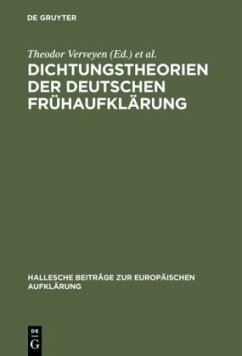In terms of the moral strictures of German enlightenment, knowledge of human nature was equivalent to judgment on it. The study demonstrates that moral narratives exemplify the resulting epistemological problem besetting moral philosophy, social ethics, and anthropology: the impossibility of truly knowing the Other. They reflect and engage with the contradiction between morals, morality, and judgment inherent in the philosophy of the Enlightenment. By combining morality and behavioural doctrine with a fictional view of the inner life of the Other they compensate for the lack of human knowledge prevalent at the end of the 18th century.
Parallel zum Wandel von der Folgen- zur Gesinnungsethik nimmt im 18. Jahrhundert das Interesse an der Psyche des Menschen zu. Menschenkenntnis zielt so auf die moralische Beurteilung des Handelnden. Doch Moralphilosophie, Gesellschaftsethik und Anthropologie der deutschen Aufklärung diagnostizieren die Unerkennbarkeit des Individuums.
Die historische Analyse systematisiert die Argumente dieser Diskussion und verfolgt ihre Reflexion in deutschsprachigen Moralischen Erzählungen. Sie zeigt, dass die ab 1750 neu entstehende Gattung Sittenbeschreibungen mit der Didaxe der Aufklärungsmoral und des moralischen Urteilens verbindet. Auf der Basis eines breiten Quellenkorpus gelingt der Nachweis, dass Moralische Erzählungen nicht nur moralisch-normativ, sondern auch problemreflexiv und in ihrer empfindsamen Tendenz innovativ sind. Denn das "empfindsame" Verhaltensideal erweist sich als ein idealischer Ausweg, den weniger die Präzeptistik als vielmehr die Literatur aufzeigt.
Moralische Erzählungen prüfen mit psychologisch-anthropologischer Kompetenz theoretische Verhaltensvorgaben. Sie analysieren Verhaltensregeln, Tugendrigorismus, Verhaltenserwartung, -wahrnehmung und -konstituierung. Den Blick ins Innere, der real verstellt ist, kann ein "allwissender" Erzähler ausgestalten. Die narrativen Möglichkeiten der Fiktion kompensieren das Nicht-Wissen vom Menschen am Ende des 18. Jahrhunderts.
Parallel zum Wandel von der Folgen- zur Gesinnungsethik nimmt im 18. Jahrhundert das Interesse an der Psyche des Menschen zu. Menschenkenntnis zielt so auf die moralische Beurteilung des Handelnden. Doch Moralphilosophie, Gesellschaftsethik und Anthropologie der deutschen Aufklärung diagnostizieren die Unerkennbarkeit des Individuums.
Die historische Analyse systematisiert die Argumente dieser Diskussion und verfolgt ihre Reflexion in deutschsprachigen Moralischen Erzählungen. Sie zeigt, dass die ab 1750 neu entstehende Gattung Sittenbeschreibungen mit der Didaxe der Aufklärungsmoral und des moralischen Urteilens verbindet. Auf der Basis eines breiten Quellenkorpus gelingt der Nachweis, dass Moralische Erzählungen nicht nur moralisch-normativ, sondern auch problemreflexiv und in ihrer empfindsamen Tendenz innovativ sind. Denn das "empfindsame" Verhaltensideal erweist sich als ein idealischer Ausweg, den weniger die Präzeptistik als vielmehr die Literatur aufzeigt.
Moralische Erzählungen prüfen mit psychologisch-anthropologischer Kompetenz theoretische Verhaltensvorgaben. Sie analysieren Verhaltensregeln, Tugendrigorismus, Verhaltenserwartung, -wahrnehmung und -konstituierung. Den Blick ins Innere, der real verstellt ist, kann ein "allwissender" Erzähler ausgestalten. Die narrativen Möglichkeiten der Fiktion kompensieren das Nicht-Wissen vom Menschen am Ende des 18. Jahrhunderts.
"This study provides a reassessment of German moral tales and a long-awaited investigation of moral tales and moral treatises from an anthropological perspective."
Brian McInnis in: Monatshefte 3.101/2009
"Gunhild Berg hat eine bedeutende Leistung vorgelegt, sie bringt der Germanistik aber auch der Soziologie Neues."
Justin Stagl in: Sociologia Internationalis Nr. 45, 1-2/2007
Brian McInnis in: Monatshefte 3.101/2009
"Gunhild Berg hat eine bedeutende Leistung vorgelegt, sie bringt der Germanistik aber auch der Soziologie Neues."
Justin Stagl in: Sociologia Internationalis Nr. 45, 1-2/2007








